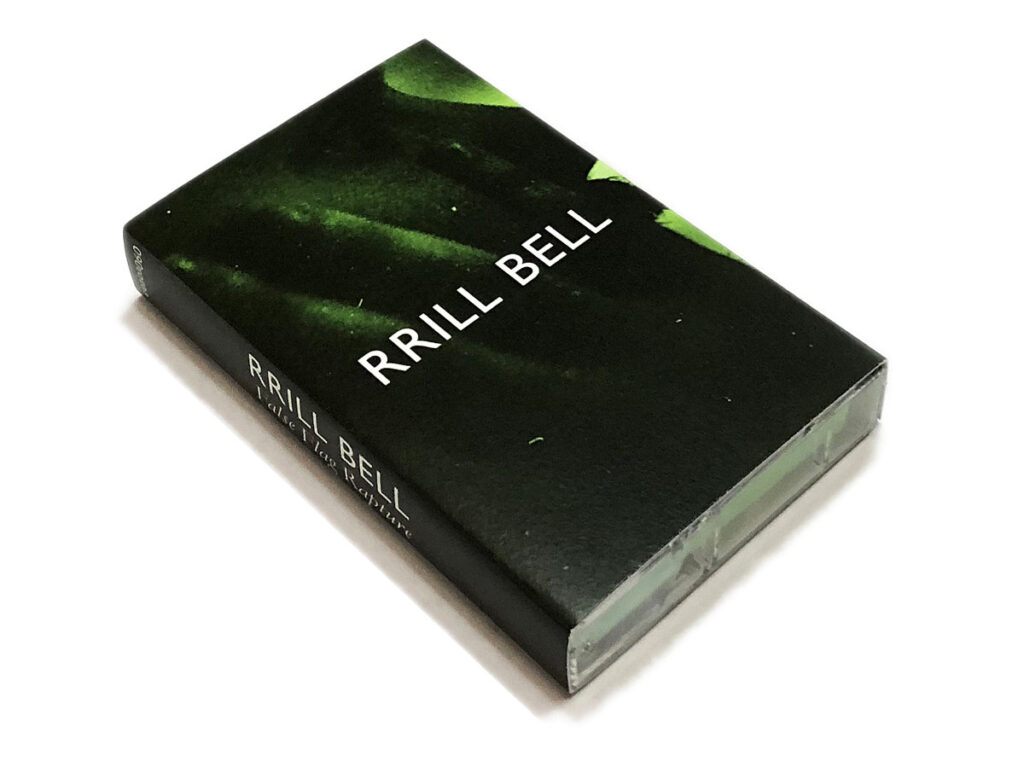Rrill Bell – False Flag Rapture
8.10.22 by Matty McPherson

Tabs Out Rule 34 states that you always have to keep your ears open for a James Plotkin cassette mastering job. The guy is like novelist James Patterson–in that both can’t not stop their respective jobs (perhaps at risk of plummeting the world into peril with their demises). Anyways, it’s a good rule that always keep me from filing just any tape away, such as Rrill Bell’s False Flag Rapture. That’s the work of American expatriate/German-based musician Jim Campbell. Campbell had sorta spent a period of six year (2015-2021) trawling the mental-hertz of witnessing a sudden dormant memory spurning to life. False Flag Rapture is an interrogation of this memory–his Slovenian grandmother singing a hymn in Slovak dialect impromptly after 50+ years.
Tabs Out Rule 35 states that “if it’s electro-acoustic its probably for big dweebs.” Fortunately, False Flag Rapture is anti-dweeb electro-acoustic. In fact, it’s more musique-concrete/dream art type shenanigans, restless without tepidness. Campbell’s MO to traverse this memory, and itself the nature of his own collective family memories, is personalized into this C42; a longform split into two sides. It’s a warranted approach, because Campbell’s music is endearingly inscrutable. He refuses to distinctly spell out the memory or his own memories from within the family tree. The tape and extrapolation of this memory is the product of studying and applying various 20th century approaches to sounds into hybrid forms. The textures of his drones and sounds strike images of analog, oral-driven pasts. Places barely connected by technology and almost moving backwards in time. Less rust belt, more “rusted and dusted” belt.
It hardly comes as a surprise that this music then often slinks or twirl like a dust devil. It opens like an analogue bubblebath, complete with morse-code bleeps and quivering haptics. It sounds of an omnibus presence seeking a shape it cannot quite shake out. As it furthers through its cycle, Campbell is able to start to tease out different elements in the mix, bringing to life a situated, personalized journey to this memory. By the ten minute mark, the piece has shifted towards a low drone, emanating textures that recall radio cabinets and dust bowl power-lines. It sounds powerless though, as it moves through radiator hum textures and blisteringly empty streets, ending as a belltower strikes back and forth. If we’re to understand this memory, we must be keen to these elements and that world they occupy.
When Part 2 enters, it’s almost Pram-ian in the way looping wind chimes create a near-nautical state of hyperawareness; they sound of the majesty one finds when in perfect range of 3 tornado sirens going off at once. To follow, Campbell does provide the a recording of the lead-up to the recording of his grandmother many odd years back. It is as if all the traversing of this music concrete was to lead to this memory. Yet, he backs it out to let Alex Morsey’s tuba and Felix Fritsche’s wind instruments block the memory, with a sense of somberness. The recording does finally emerge, plain and understated, unmanipulated for maximum impact. It quickly returns to the pre-conscious dream state that has defined so much of this long form. That stretch of the final ten minutes really might just be my favorite though. A colossal low end drone, the product of various manipulations to a tuba, mends up chiming bells, and haptics that sounds of vaporous fireflies; it flows in lockstep, safeguarding the memory for another go around on the hi-fi.
Edition of 100 42-minute lime green cassettes (with full-color six-panel Jcard in clear Norelco case, plus full-color outer Ocard featuring collage art) available at the Rrill Bell/Elevator Bath Bandcamp page.
